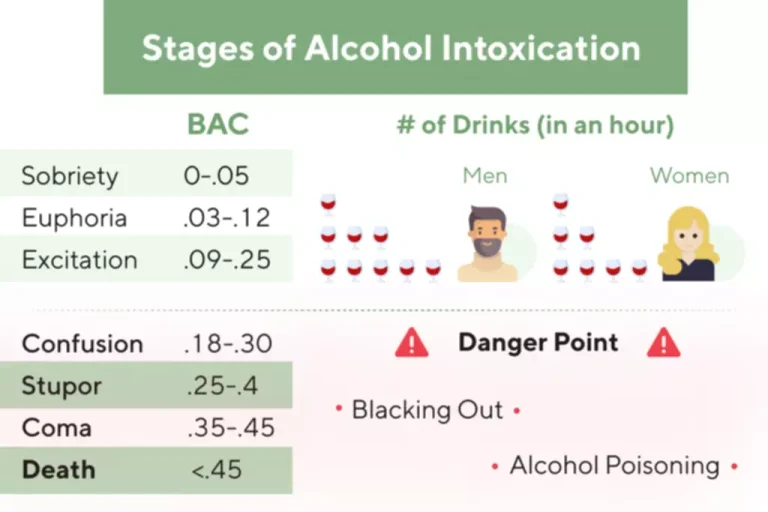
Person B would be at an increased risk, drinking heavily more often than 70% of American adults. That definition is broad enough to include all alcoholics, people who suffer from alcoholism. Many of us probably have the semi-homeless looking man drinking from a bottle of cheap wine or vodka stuffed in a brown paper bag. This stereotypical alcoholic would always be extremely drunk—morning, noon, and night. In the real world, alcoholism affects all types of people, from high school students to retired doctors, from popular athletes to high-powered attorneys, and everything in between.
Free Healthbeat Signup

When these people were employed, they may have been too busy to consume copious amounts of alcohol. But without a routine or daily responsibilities, alcohol use can more easily spiral, he says. Below are some signs that you or someone you love may be living with alcohol use disorder. These signs don’t always affect a person’s ability to carry out their day-to-day responsibilities. If you have developed a mild case of an alcohol use disorder, dealing with it can be easier the sooner you get help.
End Stage Alcoholism: Signs, Symptoms & Management
- The end-stage alcoholic suffers from a host of physical problems, including severe damage to vital organs such as the liver.
- Work performance usually suffers at this stage, and impairment in the workplace is common.
- This self-medication through alcohol consumption doesn’t necessarily occur every day.
- Drinking alone or being secretive about drinking can be another sign of alcohol use disorder.
- It’s important to be aware that alcohol doesn’t have to be a part of those things, Dr. Oesterle says.
- Your doctor or another medical or mental health professional can provide you with more information and guidance about alcoholism and suggest how to speak to your loved one.
And as tolerance builds, they’ll begin to drink more and more to achieve the same buzz or high they’re used to. Late-stage, or end-stage alcoholism, is a full-blown addiction to alcohol, often with damaging physical and mental health effects. Alcohol detox and treatment are nearly always necessary at this stage. Sometimes, people with alcohol use disorder don’t recognize their drinking is an issue, especially if they meet their work and home life responsibilities despite their alcohol dependence.
How Many Drinks Per Day is Considered Alcoholism?
- Due to its accessibility and availability, alcohol has been one of the most frequently abused substances out there for decades.
- You can always find me in nature during my self care time, usually hiking, roller skating by the beach, or surfing the waves.
- To counteract the sedating effects of alcohol, for example, the brain increases the activity of excitatory neurotransmitters, which speed up brain activity.
Nearly half of them have a close family member who is also an alcoholic. They have anaverage age of 38 years, began drinking at almostage 17, and developed alcohol dependence at anaverage age of 32 years. Intermediate familial alcoholicsdrink on an average of 172 days a year, consumingfive or more drinks on 54% of those dayswith a maximum of 10 drinks.
Years of moderate to heavy drinking can cause liver scarring (fibrosis), increasing the risk of liver diseases like cirrhosis, alcoholic hepatitis, fatty liver disease, and liver cancer. Both binge drinking and heavy drinking patterns increase a person’s risk of AUD and are common behaviors among people with AUD. In the beginning stages of alcoholism, abuse may be strictly situational. For example, a fight or argument with a spouse could provoke a husband to hit the bar for a drink or two. If relational hardships between the couple become a regular occurrence, this husband could find himself at the bar a few days a week, binge drinking to mask the emotions of his marital stress. Due to its accessibility and availability, alcohol has been one of the most frequently abused substances out there for decades.
Alcohol Use Disorder Outlook and Treatment

To others, the person may not look like they have a problem with alcohol. They may appear normal to those around them, other than the perception that they are drinking more. Although alcohol use disorder can occur at any age, it normally starts in the 20s and 30s. In addition, certain risk factors make some people more prone to the disorder. Of this type, about76% are maleand only7.6% have received a college degree, although another13.4% are still in school.

Long-Term Health Risks
End-stage alcoholics are also at a high risk of dying from accidents, trauma and suicide. Later, it can cause fatigue, bleeding and bruising, itchy skin, yellow discoloration of the skin and eyes and fluid accumulation in the do alcoholics drink every day abdomen known as ascites. Fluid buildup in end-stage liver disease is a particularly ominous sign. Fifty percent of patients with ascites typically die within two years if they don’t have a liver transplant.
- Genetic, psychological, social and environmental factors can impact how drinking alcohol affects your body and behavior.
- If two or three of these statements apply to you, you are likely to have a mild type of alcohol addiction or AUD.
- Acetaldehyde is a toxin that can damage the body’s organs and tissues before it is further broken down into acetate.
- Functional alcoholics make up19.4%of alcohol-dependent individuals.
Alcohol use disorder
Anchored Tides Recovery’s Partial Hospitalization Program (PHP) is designed for women who need intensive support while maintaining some level of independence. Our PHP offers a structured and comprehensive treatment plan that includes individual therapy, group counseling, life skills training, and holistic therapies. With a focus on addressing the root causes of addiction and mental health issues, our program provides a nurturing and empowering environment. Women in our PHP receive the care and tools necessary to achieve lasting recovery, all within a supportive community that fosters healing and growth. After ongoing heavy use, the body may develop a physical dependence in middle-stage alcoholism, where they’ll experience withdrawal symptoms if they stop drinking. Stopping habitual behaviors can be difficult for anyone, but people who are addicted to alcohol need additional medical support.

I provide both individual and group therapy, such as psychoeducation to provide insight into the disease of addiction as well as promoting long-term sobriety. Tracy Dunn is a National Interventionist and Addiction Coach who has received training at the Crossroads Recovery Coaching Academy of Seattle Washington and The Addiction Academy in Miami Florida. As the daughter of Roger Dunn of the Roger Dunn Golf Stores, Tracy knows all too well the dramatic impact that fame and addiction can have on the family system. At this point, you may notice that alcohol changes your personality and ability to experience joy outside of drinking.